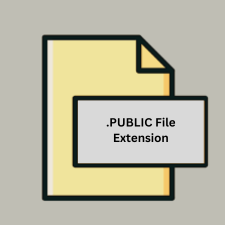.PUBLIC File Extension

OpenSSL Public Key
| Developer | The OpenSSL Project |
| Popularity | |
| Category | Web Files |
| Format | .PUBLIC |
| Cross Platform | Update Soon |
What is an PUBLIC file?
The .PUBLIC file extension is associated with OpenSSL and is used to store public key data. OpenSSL is a widely used open-source toolkit that implements the Secure Sockets Layer (SSL) and Transport Layer Security (TLS) protocols, among other cryptographic functions. The .PUBLIC files typically contain public keys used in encryption and digital signatures.
More Information.
Public key cryptography was introduced in the 1970s as part of the development of cryptographic algorithms like RSA. OpenSSL and similar tools use public key files to manage encryption keys. The .PUBLIC extension may have been adopted by certain implementations or users to standardize the naming of files containing public keys.
Origin Of This File.
The .PUBLIC file extension is not a standard extension and is not officially defined by OpenSSL. It is used by some applications and organizations to denote files containing public keys. Public key files are crucial in cryptographic systems for securing communications and verifying identities.
File Structure Technical Specification.
- Format: The content of a
.PUBLICfile is usually encoded in PEM (Privacy-Enhanced Mail) format, which includes base64-encoded data enclosed between specific header and footer lines. It may also use DER (Distinguished Encoding Rules) format, which is a binary encoding of the key. - Contents: A
.PUBLICfile typically contains the public key data, including information like the key type (e.g., RSA, ECDSA), key size, and encoded key data. - Header/Footer: PEM-encoded files often start with
-----BEGIN PUBLIC KEY-----and end with-----END PUBLIC KEY-----.
How to Convert the File?
Windows: To convert a .PUBLIC file on Windows, you would typically use a tool like OpenSSL. First, ensure that OpenSSL is installed on your system. Then, use the OpenSSL command-line interface to convert the file from one format to another. For example, you might convert a PEM-encoded public key to DER format or vice versa. Tools like PuTTYgen can also be used for specific tasks like converting keys if you’re working with SSH keys.
Linux: On Linux, you would use OpenSSL, which is commonly available. OpenSSL provides various command-line options for converting .PUBLIC files between formats such as PEM and DER. To convert a file, you would use OpenSSL commands executed in the terminal. The process involves specifying the input format, the output format, and the file paths. Linux’s terminal environment makes this process straightforward, and OpenSSL’s flexibility allows for various conversions.
Mac: On macOS, you can also use OpenSSL to handle .PUBLIC files. OpenSSL is often pre-installed on macOS, but if it’s not, you can install it via Homebrew. To convert files, you would use the terminal to run OpenSSL commands. The steps are similar to those on Linux, where you specify the conversion details and file paths. Alternatively, macOS users can use graphical tools like Keychain Access for certain key management tasks.
Android: On Android, converting .PUBLIC files may be less straightforward due to the platform’s limitations. However, you can use terminal emulators like Termux to run OpenSSL commands if you have it installed. This allows you to convert the files using command-line operations similar to those on Linux. For more complex tasks, you might need to use specialized apps or tools that support cryptographic functions.
iOS: On iOS, handling .PUBLIC files is not as direct due to the platform’s restrictions. You might need to use specialized apps available on the App Store that offer cryptographic functionalities. For more technical conversions, remote tools or web-based services can be used. Some users might employ terminal emulators or remote access tools to perform conversions via command-line utilities.
Others: For other platforms, the method of conversion will depend on the available tools and software. In general, you should look for cryptographic tools or libraries that support the handling of public key files. Many platforms offer web-based services that can handle conversions or provide software that can be installed for such tasks. The process typically involves selecting the input file, choosing the desired output format, and executing the conversion process using the available tools.
Advantages And Disadvantages.
- Advantages:
- Standardization: Public key files in PEM format are widely supported and recognized.
- Compatibility:
.PUBLICfiles can be used with various cryptographic tools and libraries.
- Disadvantages:
- Security Risk: If not properly secured, public key files can be exposed to unauthorized users, potentially leading to security vulnerabilities.
- Non-Standard Extension: The
.PUBLICextension is not universally standardized, which might lead to compatibility issues or confusion.
How to Open PUBLIC?
Open In Windows
- Software: Use OpenSSL for command-line operations or tools like PuTTYgen to open and manage public key files.
- Steps: Install OpenSSL, then use commands like
openssl rsa -in public.pem -textto view the contents.
Open In Linux
- Software: OpenSSL is commonly used. You can view or manage
.PUBLICfiles using command-line utilities. - Steps: Use commands like
openssl rsa -in public.pem -textto inspect the public key.
Open In MAC
- Software: OpenSSL or Keychain Access can be used.
- Steps: Use terminal commands or graphical tools to open and manage
.PUBLICfiles.
Open In Android
- Software: There are apps available for managing keys, but handling
.PUBLICfiles directly might require more specialized tools or scripts. - Steps: Use apps like Termux to execute OpenSSL commands.
Open In IOS
- Software: iOS does not natively support direct manipulation of
.PUBLICfiles, but apps or tools like iSH (a terminal emulator) can be used for similar tasks. - Steps: Use compatible apps or remote tools to manage the files.
Open in Others
- Web Services: Some online tools can handle public key files for conversion or inspection.
- Embedded Systems: Specialized software or firmware might be required for handling
.PUBLICfiles in embedded environments.













